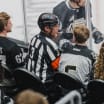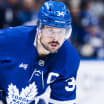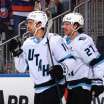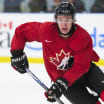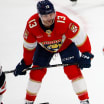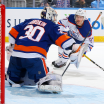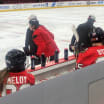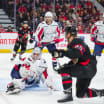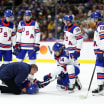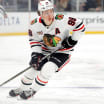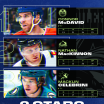Legendary hockey reporter Stan Fischler writes a weekly scrapbook for NHL.com. Fischler, known as "The Hockey Maven," shares his humor and insight with readers each Wednesday. This week Stan features his monthly Question and Answer segment with a prominent hockey personality.
His subject is Kevin Lowe, who played 19 NHL seasons and won the Stanley Cup six times, five with the Edmonton Oilers and one with the New York Rangers. The defenseman will be inducted into the Hockey Hall of Fame in 2021 and was also named to the Order of Hockey in Canada, one of the nation's highest honors.
Currently Vice-Chairman of the Oilers Entertainment Group, Lowe worked with Fischler and his wife, Shirley, on his autobiography, "Champions," in 1987, when he played for the Oilers. Additionally, Stan interviewed Lowe when he played for the Rangers in 1994. The following is based on their sessions.
Oilers learned lessons from Islanders before Cup win in 1984, Lowe says
Hall of Fame defenseman believes playoff losses to New York key to first championship
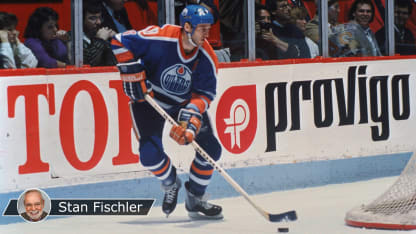
When did you become serious about a hockey career?
"I originally had hoped to become a dentist but when I realized that I didn't have the grades for that I began concentrating on hockey. I moved up the ladder from the Peewee level in Lachute (Quebec) up to midget leagues and finally the Quebec Major Junior Hockey League with the Remparts in Quebec City. I became the team's first English-speaking captain. The QMJHL was a serious hockey league and the proof is that some of my opponents were fellows who someday would be in the Hockey Hall of Fame. One was defenseman Ray Bourque and the other a slick forward, Denis Savard."
What was it like to be picked by the Oilers in the 1979 NHL Draft?
"For starters, I should point out that -- for some strange reason -- the NHL decided that it would conduct a telephone draft starting at 10 a.m. I was to await a call from my agent, letting me know where I was picked in the first round. He said I should hear from him at about 10:15 a.m. so I sat there with my mom awaiting the call. Unfortunately, we didn't know that there was some NHL phone mix up that resulted in a long delay before it all started. When the phone had not rung by 10:15 my mom said, 'My God, they're not drafting him.' Finally, at about 11:10 a.m. brngggg! I grabbed the receiver and it was my agent's secretary. She said I was picked 21st overall by the Oilers! After I hung up, I turned to my mother and said, 'Edmonton? Mom, that's even colder than Quebec City!'"
What was your first training camp with the Oilers like?
"I decided that the best course was to follow the path that got me to the NHL, play the way I had and let the chips fall where they may. Plus, I felt that the boss, Glen Sather, was in my corner. He teamed me on defense with Lee Fogolin, Jr. whose father had played in the NHL. But the big surprise was that 'Slats' decided that I should room with Wayne Gretzky who already was becoming one of the biggest names in the sport. We got along famously from Day One -- the 'Felix and Oscar' of the Oilers. Edmonton's Odd Couple."
What else can you tell me about you and Gretzky?
"Wayne realized that I was the better cook and that the Lowe roasts became a staple. From the very start I sensed that he was a down to earth unaffected young man with a clear grasp of what was happening to him and what he had to do. On top of that, we were on the same wavelength. He was dedicated to becoming the best possible hockey player in the shortest amount of time and that was a dedication I shared."
How did Sather handle Gretzky?
"He used what I call 'The Stallion Theory.' If you have a stallion who wants to run, you don't rein him in, you want to let him go. Same with Wayne. He had all the natural talent in the world, so let him do what he does best. 'Slats' knew that 80 percent of Wayne's efforts were concentrated on offense and the other 20 percent might have been defense. Glen turned his back to that. He knew that this guy was a great player. 'Slats' was willing to bend with a particular player if he felt that the club would benefit overall. That's the way it was with Sather and Gretzky. In the end 'Slats' compromised for the good of the team.
How would you describe the Oilers spirit in the early 1980's?
"For one thing, we laughed at the idea of pressure being part of the game. Our bench was more like a collegiate fraternity than a big-league team. The kids on our outfit -- me included -- would cheer from the bench during a game, 'HERE WE GO OILERS, HERE WE GO!!' like it was a Saturday afternoon football game. And, make no mistake, this came perfectly natural to us at the time. As Wayne said, 'We're creating a winning attitude.'"
You were close to Mark Messier. What was he like?
"The one word I'd use to describe Mark as a player would be 'fierce.' One scouting report that fit him well was, 'He can fight, he can hit, he can score and can set up goals and he knows what to do with his stick. He also has a wild look in his eyes.' All in all, Mess was a very intimidating player. I remember that somebody once said that Mark ran over life like it was an enemy defenseman. What happened with us was that in no time at all he became the soul of the Oilers. He always wanted us to play -- like him -- with reckless abandon. He also symbolized the attention we were getting as a glamour team and pretty soon Hollywood personalities like Michael J. Fox and Alan Thicke became our pals."
What did the Oilers learn losing to the New York Islanders in the 1981 and 1983 playoffs?
"First of all, when we met in 1981 (Quarterfinals), they already had a lot more playoff experienced than we did. In the second playoff meeting (1983 Stanley Cup Final), the Islanders had more discipline, opportunism and goaltending. They were a bit too much for us although we did learn something from defeat the second time around. Funny thing was that it was provided after we had lost the series. We were dressed and heading out to catch our bus. During the long walk down the corridor between the two clubhouses at Nassau Coliseum, we passed the winner's dressing room. We could see them celebrating but we also saw the ice packs on their shoulders, their jaws and their knees. A lot of them soon would have to have operations because of their injuries. That's when we realized what they had gone through to win and we said to each other, 'Hey, now we know what it takes. You gotta' put your face in front or slapshots, take a punch in the face. You gotta' sacrifice -- that's what winning is all about.' After that we didn't need any more lessons."
What changed in the 1984 Stanley Cup Final?
"The first game of the Cup Final was played on the Island and it was so important to get off on the right foot. [Kevin McClelland] was the guy to do it with a kind of fluky goal; a shot from the left side that -- considering all of Bill Smith's big saves -- didn't figure to be a problem. But Kevin's shot was deceptive, especially since it was fired from a very sharp angle where he was almost against the boards. The other thing that was unusual is that 'Smitty' didn't seem to be screened on the play. He must have seen it, only too late. It went right past his left skate and into the net. That gave us a one goal lead and from that point on (Oilers goalie) Grant Fuhr played the game of his life and we took them, 1-0. The Islanders came back and beat us bad in the second game, but 'Slats' said not to worry.
Why not?
"Glen told us that winning one game in Nassau was good enough since the next three games would be in Edmonton. For some reason the league changed the playoff format for the Final. So, it started with two games on the Island and the next three straight in Edmonton. That proved to be a good break for us because a win in Game Three meant that we had an opportunity to wrap up the series at home."
What was the turning point in Game Three?
"The Islanders had taken the lead and Billy Smith was formidable in goal. At the time they looked like they had the situation well in hand. Then 'Mess' took over. He steamed down the left side, going one on one with defenseman Gord Dineen. He breezed around Dineen as if Gord was a lamp post and in virtually the same motion blasted the puck past Smith. From that point on we never looked back. Slowly but surely we peeled away the Islanders tight defensive shell. We could tell that they were getting tired. For many of their guys it was their 20th straight playoff series since 1980 and stalwarts like Denis Potvin had slowed down. We wiped them out 7-2 in the next game and led 4-0 in what was to be our clincher. Then Pat LaFontaine scored two quick ones for them and we started worrying again. But Grant Fuhr stopped a John Tonelli breakaway and we went on to win our first Cup."
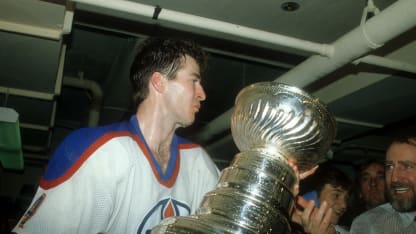
© B Bennett/Getty Images
What went through your head when you knew the Cup was won?
"At first, I couldn't think straight because so many things were going through my head. Then the thoughts crystallized before the green light finally flashed. I set out all my life to win this and, lo and behold, we are going to win it! Then, I wondered what my teammates were thinking, and another thought came to mind: 'I'm so proud of all the guys. Everyone in Canada is seeing us do this.' My heart was pumping so hard that my mind sort of slowed up and slowed up. Now the clock was down to the final seconds 'five, four, three, two, one. WE DID IT!' I was on the ice, saw Andy Moog and jumped on him. Then things began to blur. I don't know what happened to my gloves, or my stick or anything."
How did you feel about the Islanders?
"I felt genuinely sorry for them because I knew exactly what it was like to be in their shoes. I'll never forget the emotion in the faces of the Sutter Brothers, Duane and Brent. Both were crying. Denis Potvin was like a soldier, like a general of an army in battle, admitting defeat in his intelligent, straightforward way. I could see that in his face. Clark Gillies' face told me, 'It's been a great career for me, and we've had our day, but it seems all to be ending.'"
How did your family react?
"My sister, Nancy, phoned me in our dressing room, telling me how excited and pleased everyone was and then my mom made her way to the dressing room and we hugged. This was something very special because for me the win was for my whole family but particularly for my mom. Because dad had died at such an early age, mom raised me by herself. She had come to all my Junior games and was a huge supporter of mine. So, a large part of it was for her but parts of the joy were also for the others. Let's put it this way, there's enough excitement in winning the Stanley Cup for the entire family. Everyone reaps the benefits and everyone can enjoy it. From that point on until about three days later, I can't tell you a heck of a lot about what happened. I know I had a lot of fun -- but don't ask me what I did. I do know this much: WE DID IT!!"
